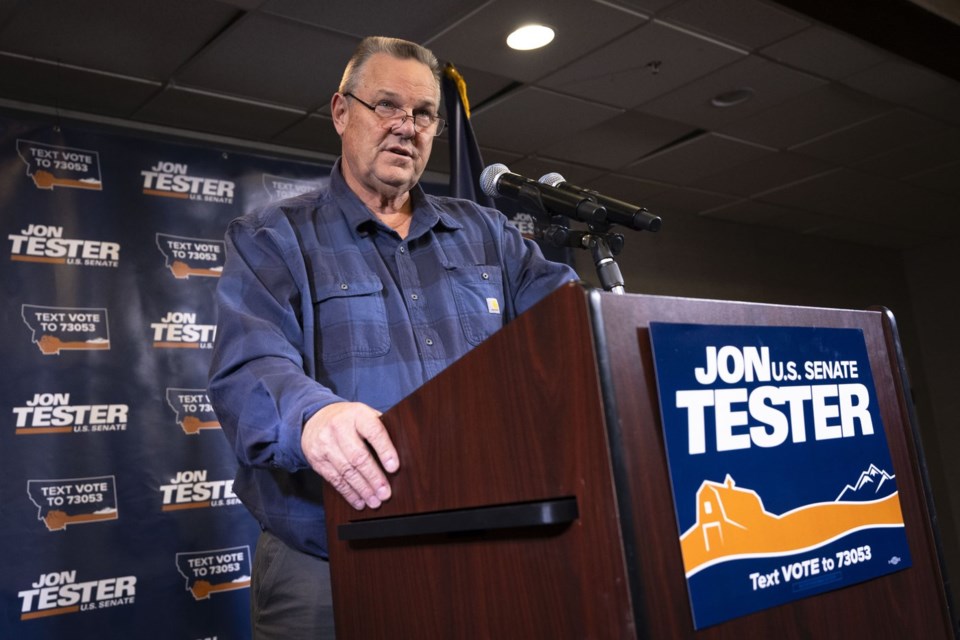BILLINGS, Mont. (AP) ŌĆö Republican Tim Sheehy bolstered the GOPŌĆÖs Senate majority with a victory over three-term Democratic U.S. Sen. Jon Tester in a contest of national importance that featured a record-setting torrent of spending by the two sides.
Sheehy, a former U.S. Navy SEAL, closely aligned his campaign with Donald Trump and leading conservatives while painting Tester as a corrupt Washington insider. The Republican also promised to address the southern border crisis and curb government regulation.
Democrats entered Tuesday's election with a narrow two-seat majority in the Senate. Tester ŌĆö a moderate and the chamberŌĆÖs only working farmer ŌĆö was considered one of the most vulnerable Democrats on the ballot nationwide.
Republicans on Tuesday night with wins in Ohio and West Virginia.
Sheehy said in a statement that he's been serving the country since he was 18 and was honored to continue his service in the Senate.
ŌĆ£Since day one, weŌĆÖve been running a grassroots campaign, talking directly with Montanans about how we make Montana affordable again, make America strong again, and bring back Montana common sense, which means a secure border, safe streets, cheap gas, cops are good, criminals are bad, boys are boys, and girls are girls,ŌĆØ he said.
Sheehy, 38, sought to dent the lawmakerŌĆÖs reputation for authenticity by highlighting more than $500,000 that lobbyists and their families donated to Tester during the last election cycle.
The tactic mirrored TesterŌĆÖs own 2006 campaign, when he beat a three-term Republican incumbent who got ensnared in a Washington, D.C. lobbying scandal.
Sheehy touted his military service and business experience, and pushed past questions raised over a bullet wound that he admitted lying about. He also sought to highlight his private sector success as the founder of an aerial firefighting company ŌĆö even as the firmŌĆÖs stock price tumbled.
Sheehy pitched the race as one of national importance for Republicans eager to undo four years of Democratic rule in the Senate and White House.
Tester was the last member of his party to hold statewide office in Montana and the last Democratic senator from the five-state Northern Plains region. When he first entered office in 2006, Democrats held six of the regionŌĆÖs 10 Senate seats.
Hoping to withstand the conservative wave thatŌĆÖs swept the region, Tester, 68, appealed to moderate Republicans and independents. That included pairing his Senate campaign with a ballot proposal enshrining abortion rights into the state constitution ŌĆö along with frequent reminders to voters that heŌĆÖs a working farmer whoŌĆÖs also worked hard for them.
He also tried to distance himself from Democratic presidential candidate Kamala Harris. He emphasized his support for abortion rights in hopes of appealing to moderate Republicans and independent voters.
About 4 in 10 voters said Senate control was the most important factor in deciding how to vote in MontanaŌĆÖs Senate race, according to AP VoteCast, a sweeping survey of more than 1,100 voters in the state.
Overall, almost 6 in 10 Montana voters said the future of democracy was the most important factor in casting their vote. About one-third said the high price of groceries, gas, and other goods was the most important factor, and roughly 3 in 10 voters said the future of free speech in the US.
About a quarter of voters said abortion policy was the top factor in casting their vote in the general election.
TesterŌĆÖs narrow 2006 victory over a three-term incumbent Republican marked a high point for Montana Democrats. It came in a mid-term election and amid growing dissatisfaction with the Bush administrationŌĆÖs war in Iraq.
More than $300 million was spent in the contest, much of it from outside groups with shadowy donors. The spending equated to about $500 for each active voter ŌĆö a record on a per-voter basis.
Democrats had a significant cash advantage, and in the raceŌĆÖs final days, TesterŌĆÖs campaign plastered Montana newspapers and airwaves with advertisements amplifying claims from a former park ranger that Sheehy in his arm.
Sheehy said wound came from combat in Afghanistan and wasnŌĆÖt accidentally self-inflicted as he told the ranger in 2015. The Republican said TesterŌĆÖs campaign was engaging in character assassination and other SEALs vouched for SheehyŌĆÖs integrity, but didn't release any corroborating medical records.
MontanaŌĆÖs political profile has shifted dramatically since TesterŌĆÖs first election in 2006. It went from a ŌĆ£purpleŌĆØ state that traditionally sent a mix of Democrats and Republicans to higher offices, to one where partisan divisions rule and the GOP enjoys a supermajority in the state Legislature.
Tester warned throughout the campaign about ŌĆ£outsidersŌĆØ such as Sheehy ŌĆö who came to Montana in 2014 and bought a ranch ŌĆö driving up housing prices and restricting hunting and fishing access for the general public.
Voter Kael Richards, 22, of Bozeman said Montana residents typically resent rich people from out of state like Sheehy, who arrived in Montana a decade ago. But Richards said he was willing to look beyond that factor for the Senate race and was impressed when he found out Sheehy ran an aerial firefighting business.
ŌĆ£TesterŌĆÖs been there so long, since weŌĆÖve grown up weŌĆÖve known nothing but Tester,ŌĆØ Richards said. ŌĆ£I feel like there needs to be a change. Our housing prices have never been higher. Our land prices have never been higher.ŌĆØ
Matthew Brown, The Associated Press


